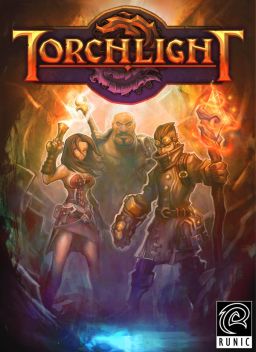
Given the critical acclaim of Blizzard Entertainment's Diablo series, it was only natural for there to be imitators, among them being Runic Games' Torchlight, which saw its digital release late in 2009 and retail release the following year, its creators actually behind the first and second games in the Blizzard hack-and-slash franchise. Is it a pale imitator or plagiarism at its finest?
Much like the original Diablo, the player can choose from different classes upon starting a new game, including the Destroyer, which specializes in melee combat; the Alchemist, which specializes in magic; and the Vanquisher, which specializes in ranged attacks. The player can also choose and name a feline or canine companion for the protagonist, not to mention a difficulty level. Afterward, players begin the game in the titular town of Torchlight, where they can perform functions such as shopping for new equipment and items. When ready, the player can venture into the multifloored random dungeon (although floors stay in their current state like in Diablo) to battle enemies, gather new equipment and items, and teleport back to town with a magic scroll to sell equipment, report on sidequests, and perform other tasks.
Gameplay is similar to the Diablo games, where players can physically attack enemies or cast mana-consuming magic with different effects, with foes occasionally dropping money, items, and equipment. Control can vary depending upon the medium the player uses, with the Steam Deck's trackpads in portable mode helping greatly yet admittedly taking some getting used to, but the controls are customizable. Players naturally earn experience from killing enemies, level-ups sporadically happening, in which case they can increase various stats by five points (most weapons and armor having stat requirements) and invest one point into different skills native to or shared among classes. Killing "named" adversaries also earns players Fame, which, when raised enough, results in extra ability points. Some items, like in the Diablo games, require the player to identify them with a consumable scroll.
The game handles death quite well, with players receiving several choices like paying money to revive at the beginning of the current floor or returning to the town with no penalty, fairer punishments, unlike many Japanese RPGS. One superiority versus the Diablo games is that the player can give excess items to their pet and send them back to town, after which they return after a fixed interval with the money gained from the items' sales. One skill into which players can invest points reduces the time pets need to be away, and this neat feature counters the need to go back to Torchlight often. Aside from the learning curve associated with playing the game on the Steam Deck, the mechanics work surprisingly well.
Control is solid also, with a linear structure that keeps the player moving in the right direction and a more generous, but still limited, inventory space than in the Diablo titles, alongside the ability to send a pet to town to sell surplus goods. The convenience of town scroll portals is another positive aspect, as is the need not to retrace steps when breaking from the game. Ultimately, Torchlight interacts surprisingly well with players.
As with most RPGs in which the player customizes their protagonist, the story can feel light at times, yet each class has varying story scenes, and the narrative never feels forced down the player's throat, which is a good thing. The dialogue is well-written, there is enough story for a game of its meager length, and on the whole, the plot certainly doesn't disappoint.
The music creates a nice ambiance, although the tracks aren't exactly catchy. However, the sound effects and voicework are near-note perfect, so the aurals still rise above average.
The 3-D graphics contain plenty of polish and don't detract from the experience, either, with different equipment affecting the protagonist's appearance, fluid animation, beautiful dark environments, and fitting colors. However, they can look slightly blocky and blurry-textured when seen up close, yet look great most of the time during the gameplay when the player keeps the camera well above the various environs.
Finally, one can finish the game in around twelve hours, with an extra dungeon having seemingly infinite floors providing excellent lasting appeal alongside achievements, the different classes, and sidequests.
On the whole, Torchlight, given its solid hack-and-slash gameplay, tight control, great sound, polished visuals, and infinite lasting appeal, is a very positive experience and is, as I stated before. "plagiarism at its finest." There are some minor issues, including the general unmemorable nature of the soundtrack and the light-handed narrative, but the other areas compensate for that. Those on the fence can play a free demo before considering buying the whole game, with a great chance that they will do so and experience what is perhaps one of the gold standards of its subgenre.
The reviewer played the digital version of the game on the Steam Deck in portable mode as an Alchemist.
| Score Breakdown | |
|---|---|
| The Good | The Bad |
|
|
| The Bottom Line | |
| One of the gold standards of hack-and-slash action RPGs. | |
| Platform | Steam Deck |
| Game Mechanics | 9.5/10 |
| Control | 9.5/10 |
| Story | 9.5/10 |
| Aurals | 9.5/10 |
| Visuals | 9.5/10 |
| Lasting Appeal | 10/10 |
| Difficulty | Adjustable |
| Playtime | 12+ Hours |
| Overall: 10/10 | |